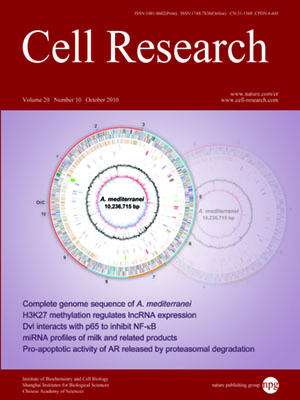
Volume 20, No 10, Oct 2010
ISSN: 1001-0602
EISSN: 1748-7838 2018
impact factor 17.848*
(Clarivate Analytics, 2019)
Volume 20 Issue 10, October 2010: 1138-1147
ORIGINAL ARTICLES
Proteasomal degradation unleashes the pro-death activity of androgen receptor
Bradley Godfrey1, Yuting Lin1, Jeffery Larson2, Bonnie Haferkamp1 and Jialing Xiang1
1Department of Biological, Chemical, and Physical Sciences, Illinois Institute of Technology, 3101 South Dearborn Street, Chicago, IL 60616, USA
2Department of Biomedical Engineering, Illinois Institute of Technology, 3101 South Dearborn Street, Chicago, IL 60616, USA
Correspondence: Jialing Xiang,(Xiang@iit.edu)
Androgen receptor (AR) is able to promote stress-induced cell death independently of its transcription activity in androgen-independent prostate cancer cells. Yet, the underlying mechanism is incompletely understood. Here, we report that stress-induced proteasomal degradation of AR contributes to its pro-death activity. Upon exposure to ultraviolet light and staurosporine, AR underwent proteasomal degradation. Blockade of AR degradation significantly suppressed stress-induced apoptosis in androgen-independent prostate cancer cells. Ectopic expression of the AR N-terminal (AR-N) domain, which lacks DNA- and ligand-binding abilities, led to cell death without any additional death stimuli. Truncation analysis revealed that AR-N domain contains several sub-domains that regulate the pro-death activity of AR, specifically the first 105 amino acids, which function as a minimal pro-death domain acting upstream of caspases. The pro-apoptotic activity of AR N-terminal fragments was suppressed by ectopic expression of Bcl-2 or selected caspase inhibitors. Thus, our results reveal a novel mechanism by which AR promotes stress-induced cell death in androgen-independent prostate cancer cells.
Cell Research (2010) 20:1138-1147. doi:10.1038/cr.2010.65; published online 18 May 2010
FULL TEXT | PDF
Browse 2212


